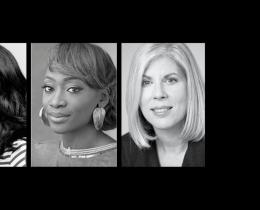Omega: What exactly is the “man box” and how does it serve, as well as limit, a person's masculinity?
Tony: The “man box” is how men have been collectively socialized to understand what it means to be a man. It doesn’t mean that all men respond in the same way to this collective socialization but it does mean that all men have an understanding of this socialization.
I use the example of the man box to have discussions with men in a simple but serious way. The ingredients in the box are how men have been socialized to define what it means to be a man in masculine stereotypes. This box includes messages like, “men must be tough, strong, athletic, dominating, aggressive, and show no emotions (with the exception of anger). The box is designed (knowingly or unknowingly) to distance men from the experiences of women, creating a lack of interest in their experiences and therefore creating a culture that allows violence against women to exist in epidemic proportions.
Omega: Your work delves fearlessly into issues around male accountability in contemporary society, specifically around violence against women and families. So what, by your definition, does it mean to be a fully realized man in today’s world?
Tony: I question the word “fully” because I do believe that, for the most part, all men are sexist. It’s not whether we are, it’s whether we are recognizing it and doing what we can to challenge it in our lives and in the lives of others.
The man that I envision is one who supports all aspects of equality for men and women. He is a man who has the ability to educate, re-educate, love, and challenge (when necessary) other men in recognizing and supporting all aspects of equality for men and women. He is also a man that knows he benefits from a male-dominated society. While he works to end sexism as we know it, he himself is sexist. So he does the work that he does, he lives the life that he lives while challenging himself and supporting and challenging others—all while understanding that he has not arrived; he is just on the journey.
Omega: What do you think the strongest, and most destructive, aspects of manhood today?
Tony: For us at A Call to Men, we look at it as an equation. While there are wonderful things about being a man, there are three aspects of manhood we focus on that have a direct correlation to men’s violence against women as well as the destruction of healthy manhood. Men are collectively socialized to view women as less valuable, as property, and as objects (particularly sexual objects). We believe this is an equation that creates a culture of men’s violence against women, along with supporting the destructive behaviors associated with manhood.
Omega: If there were one emotional lesson that you could impart on boys today, what would it be?
Tony: To begin to recognize that anger is a secondary emotion to fear or emotional pain. Our boys are taught to not recognize fear as well as emotions in general. So there is a disconnect in understanding that when they are angry, what is actually going on is that their feelings are hurt. If you ask a boy, “Why are you upset with your friend?” he would immediately say, “Because he made me angry." Teaching our boys to recognize fear and emotional pain can have a tremendously positive impact on their development from boys to men.
Omega: What lessons have you personally encountered about parenting that have radically changed your approach or outlook?
Tony: One of the lessons I’ve learned over the years is the tremendous impact that we as parents have in establishing gender roles/gender norms in our boys and girls. As a father of a son, I have a tremendous impact on how he views the world as a man, which obviously includes the value he sees or does not see in women.
I’ve also learned it is an ongoing effort that at times can be overwhelming. With every view or belief that I try to instil in my son, there are 10 venues countering that information—be it media, video games, sports, etc. The key is keeping the channels of communication open so that these ongoing discussions continue throughout his development, particularly through his adolescent years.
Omega: How does your message address men's relationships with one another?
Tony: While at its roots our work was created to have a positive impact in ending men’s violence against women, over the last 15 years it has expanded to include developing respectful, loving, and healthy manhood, which also decreases violence against women.
The very same norms in the man box that have created a culture of violence against women have created inappropriate relationships amongst men. The norms of this man box are also the foundation of men’s violence against men, bullying, homophobia, and many other experiences that limit our collective liberation.
Omega: How can men and women maintain a respectful, compassionate, and thriving family dynamic?
Tony: I think it would be very beneficial if we as parents understood the bigger picture, the long-term impact that gender norms have on the development of our children and our society as a whole. So when we are telling our son, "You are the man of the house, protect your mother and your sister,” what are we then saying about women? When we tell our daughters, “It’s okay, boys will just be boys,” what are we saying about men?
It is incumbent upon us to have critical conversations with our children and not leave the work of gender and nongender conforming experiences to others.



